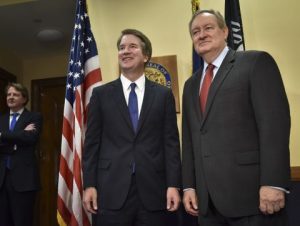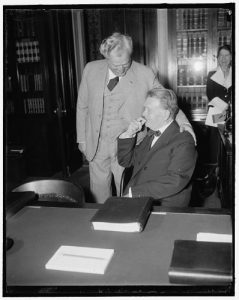The regular blog will appear here as well from time-to-time.
I’ve long admired the Trib’s editorial page, an institution in Idaho that most of the state’s political junkies consider a “must read.” The page has long been the home of great editors and writers, including Bill Hall, Ladd Hamilton, Jim Fisher and Marty Trillhaase. I’ll hope to do my small bit to uphold that reputation.
Thanks…here is the first piece.
————
Idaho’s two Republican U.S. senators will vote soon to confirm Judge Brett Kavanaugh for a seat on the U.S. Supreme Court helping secure a very conservative court for a generation or more. That Mike Crapo and Jim Risch would support a Republican president’s judicial nominee is no surprise. They have eagerly participated in efforts to turn judicial confirmations into just one more hyper-partisan exercise.

Kavanaugh’s elevation to the Supreme Court likely means the court will become as conservative as any since the 1930s and despite claims that a partisan like Kavanaugh will respect precedent, his appointment could well usher in a raucous period where much long settled law – Roe v. Wade and campaign finance limits, for example – will be up for reconsideration. Where a consensus selection might have reversed the partisan taint now infesting the court a polarizing choice will only make the court more political.
Meanwhile, the notion of “advice and consent” has given way to debate over process and documents. Any pretense that the Senate might actually conduct a bipartisan review of a nominee’s fitness and beliefs now seems as quaint as the concept of judges being above politics.
Both Crapo and Risch expressed support for Kavanagh well in advance of any hearings. Crapo, a member of the Senate Judiciary Committee, the committee that will assess Kavanaugh’s fitness, needed just one meeting to pronounce Donald Trump’s nominee a jurist of “fairness, judgment, and temperament.” Risch was at the White House for the announcement of Kavanaugh’s appointment and immediately said, presumably with a straight face, that the selection reflects “President Trump’s deep commitment to upholding our U.S. Constitution.”

Other Republican senators, including members of the Judiciary Committee, have actually participated in mock hearings preparing Kavanaugh for his moment under the television lights. Confirmation of this type is a flagrant abandonment of the notion that a co-equal branch of government should actually conduct the type of inquiry required by our Constitution.
While it is true that high stakes judicial nominations have always involved political and partisan considerations – Democrats play the game, as well – Idaho senators in the past often exercised real independence, occasionally even against the wishes of presidents of their own party.
Idaho’s William Borah, never a get-along-go-along Republican, was a senior member of the Judiciary Committee in 1932 when he lobbied Republican President Herbert Hoover to appoint New Yorker Benjamin Cardozo to replace the distinguished jurist Oliver Wendell Holmes. Hoover was reluctant, perhaps because Cardozo, like Holmes, had a reputation for judicial independence. Hoover also hesitated because New York was already represented on the high court. Borah rejected the geographic argument saying Cardozo was a respected national figure as important to Idaho as anywhere else. Borah also wasn’t pushing for a partisan, but for a deeply respected non-political judge. He may also have impressed upon Hoover that he would use all his substantial influence in the Senate to thwart any other nominee. Borah’s independence prevailed and scholars of the court now consider Cardozo one of the greatest justices.

There is actually a bit of a tradition of Idaho Republicans pushing back against Republican presidents and their court appointments and at times real bipartisanship has prevailed.
Borah, a remarkably independent senator, defied Hoover in 1930 and cast the deciding bipartisan vote against a Supreme Court nominee considered outside the mainstream.
Idaho Republican Senator Herman Welker bucked fellow Republican Dwight Eisenhower in 1955 when he voted against the nomination of John M. Harlan. Welker was locked in a bitter fight with the administration at the time and may have employed his vote to express irritation with Eisenhower, but by today’s standards Welker’s move was a striking example of senatorial independence.
And in 1969 Republican Senator Len Jordan, a pretty conservative guy, joined Democrat Church to oppose Nixon’s nomination of Clement F. Haynesworth. Haynesworth was denied confirmation on a bipartisan basis when evidence surfaced of the judge’s conflicts of interest.
When the Senate confirmed Eisenhower nominee Potter Stewart in 1959 on a broadly bipartisan vote Idaho’s bipartisan delegation – Democrat Church and Republican Henry Dworshak – voted for Stewart.
Nixon nominees – Harry Blackmun and Lewis Powell – received overwhelming bi-partisan support, including from Jordan and Church. Gerald Ford nominated only one Supreme Court justice, John Paul Stevens in 1975, and Church and Republican Jim McClure where part of a unanimous Senate. In the early 1990s Republicans Larry Craig and Dirk Kempthorne supported Bill Clinton nominees Ruth Bader Ginsberg and Stephen Breyer, but since then partisanship has reigned supreme and consensus candidates have disappeared.

Crapo and Risch opposed Barack Obama’s nominations of Sonia Sotomayor in 2009 and Elena Kagan in 2010 and both supported the unprecedented decision by the GOP controlled Senate in 2016 to not even hold hearings on Barack Obama’s nomination of a well-regarded moderate, Merrick Garland. Neither senator deigned to even meet with Garland. And after eliminating the filibuster on judicial nominees last year Crapo and Risch were part of the Republican majority powering through Trump’s nomination of Neil Gorsuch.
Sadly confirmation hearings have become a kind of ritualized kabuki theater where all participants play a pre-determined role and where everyone knows the outcome before the opening gavel drops. That is not what the Founders envisioned. The current approach – obsequious deference by Republicans to any Republican nominee and an overwhelming emphasis on partisan consideration – debases the idea of “advice and consent” and will only further erode the independence of the Senate and the Court.
